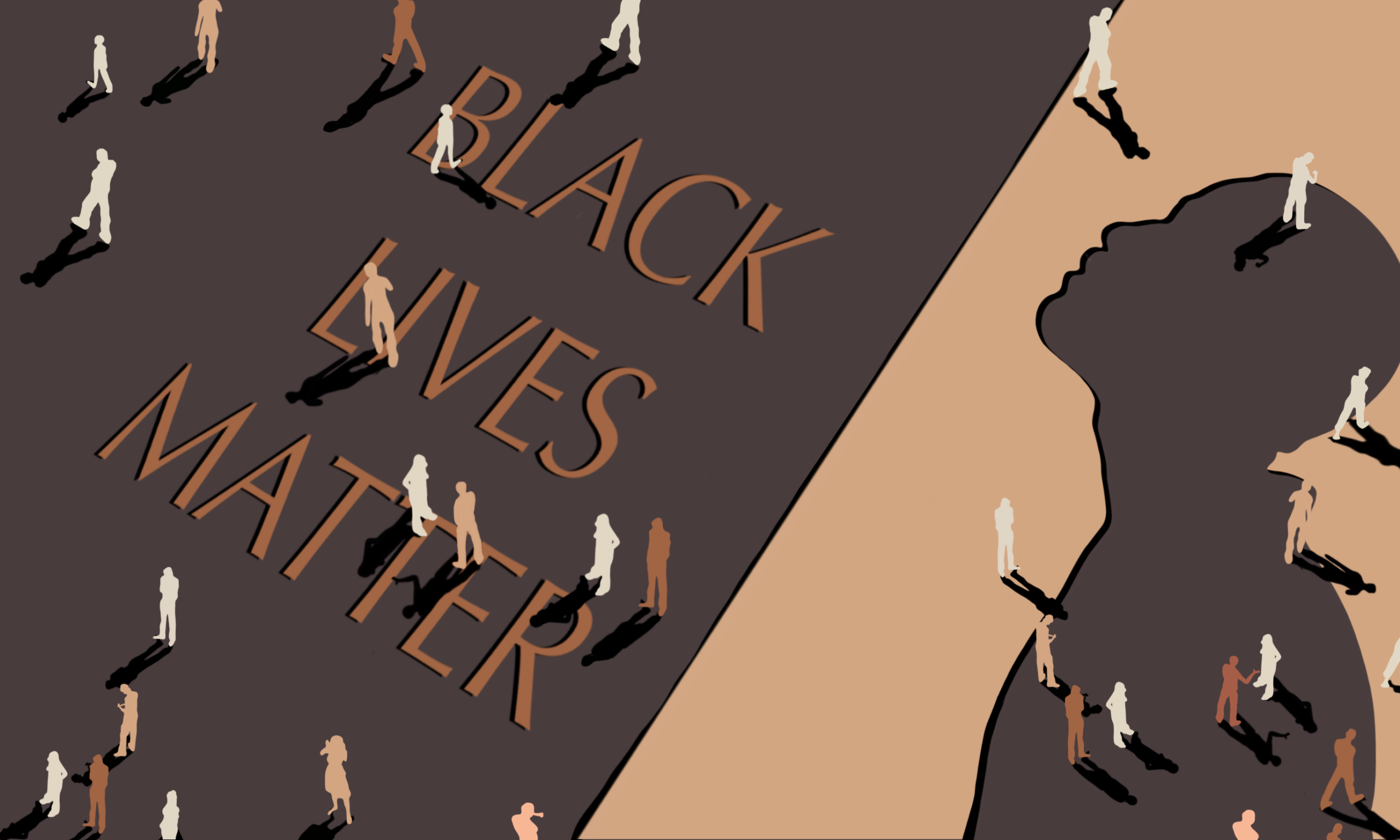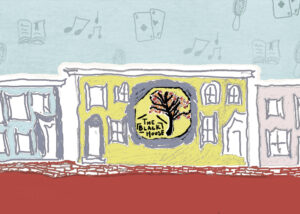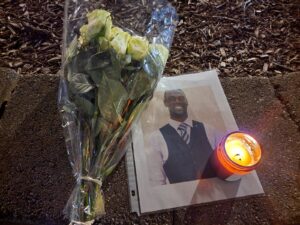CW: Violence and racism.
Emmett Till was lynched for offending a white grocery shop owner in 1941. He was 14 years old. Trayvon Martin was 17 when he was shot dead in his own neighborhood for carrying an Arizona Iced Tea and a pack of skittles in 2012. Eric Garner was strangled to death in 2014 on the unconfirmed suspicion he was selling single cigarettes; at the time, his youngest child was only 3 months old. Tamir Rice was 12 when he was shot, immediately upon police arrival, for playing with a toy gun in 2014. Breonna Taylor, a Black EMT in the midst of the COVID-19 pandemic, was killed while police completed a search warrant for somebody else in March 2020. Tony McDade, a transgender Black man, was killed last week in Florida while unarmed. Mike Brown was killed in 2014. Laquan McDonald was killed in 2014. Pamela Turner was killed in 2019. George Floyd was killed just a few days ago. The list goes on. Across Black America, we are dreading the answer to a question that never escapes us: who’s next?
On May 25, 2020, a police officer kneeled on George Floyd’s neck for 8 minutes and 46 seconds, killing him. Floyd’s death has once again raised a question this country has struggled to answer for years: do Black lives matter? I’ll answer that question for you: as it stands now, Black lives DON’T Matter. Every day another Black life is taken—murdered in cold blood. Black families and communities are forced to mourn the loss of someone we may not even know. We mourn because we know the next ____ in #JusticeFor____ could be our own name or someone close to us. We mourn because our children and our grandchildren will inherit this debate on the value of their lives. We mourn because across this nation, we are under attack for breathing while Black. For years, our bodies have been treated as if they are disposable and our deaths have been written off as unfortunate, but inevitable. The murder of Black people has grown to be so common in the news that many members of the public have grown desensitized to how badly this loss of life needs to be addressed.
Thousands of Black lives have been taken because of the public’s complacency. This is the public that will make #AllLivesMatter trend on Twitter when another Black person is murdered. The public that will find any reason to demonize our Blackness and fault us for our own loss of life. The public that claims to be an ally in solidarity with us but calls the police on us in our own homes and neighborhoods. The public that continues to allow Black bodies to be murdered in plain sight. One of this country’s first acts of protest was a riot over taxes on tea. In spite of this destruction of property, the Boston Tea Party riot is regarded as a justified act of protest for liberation. The same standard must be applied to Black people peacefully protesting with their lives on the line for their own liberation: freedom from state violence.
I’m tired of Black lives not mattering. I’m tired of seeing people who look like me die. I’m tired of having to educate our “allies” on how to show up for our community. I’m tired of knowing my children will have to modify every aspect of their behavior and mannerisms to ensure they aren’t misconstrued as threatening. They’ll have to grow up too fast and give up pieces of their childhood for their own safety. I’m tired of your complacency. I’m tired of wondering if I’m next. While I by no means speak for all of Black America, I know for a fact much of our community shares these same sentiments. Colin Kaepernick is tired of Black lives not mattering. Sybrina Fulton is tired of Black lives not mattering. Shaun King is tired of Black lives not mattering. Black Lives Matter (BLM) supporters are tired of Black lives not mattering. As BLM supporters, we are tired of so-called “allyship” allowing us to be killed. So what does good allyship look like? Every time a tragedy like this happens, I am asked by people close to me what I would like to see in an ally. Allyship comes in many forms, but there are a few fundamentals that stick out to me.
-
- Support Black womxn. Black womxn are the strongest pillar we have in the Black community. They are subjugated to stereotypes in an attempt to tear down their strength and yet they continue to lead our community. One they are often forced to endure is “The Angry Black Woman”, characterizing Black womxn as mean-spirited, uneducated, and aggressive. The Angry Black Woman stereotype has many points of origin, but regardless its purpose remains the same. The goal of this stereotype is to silence Black womxn. To make Black womxn self-conscious of their self-expression and question if their feelings are valid. But Black womxn are not mean. Black womxn are not difficult to work with. Black womxn are not unnecessarily loud. However, Black womxn are angry. They’re angry because the community they have led is under attack. Black womxn have a right to be angry and to express this anger. Outspoken and articulate, passionate and strong, Black womxn are fighters. Because of this, Black womxn are the heart and soul of some of our most influential and transformative social movements, including Black Lives Matter. Supporting them is supporting our community.
- Give us the space to feel our emotions to the fullest. We are literally being killed in the streets every day for no reason other than breathing while Black. That’s personal. It is never your place to tell us how we should feel, especially in times like this when our movement is most active. If you don’t support what we have to say or you have some reservations, then simply don’t say anything and consider other ways you can support our movement like supporting Black-owned businesses or sharing mental health resources with Black people in your life. Do not attempt to censor us. We have a right to express our anger, our pain, and our urgent need for change by whatever means we feel suffice.
- Own your privilege. If you choose to join our protests and our rallies, understand your role is to support us in our fight for freedom from oppression. Our rallies are highly policed. As someone who isn’t Black, your relationship with the police is inherently different from ours. Use that difference to our advantage and help defuse tensions with officers that may arise. By inserting yourself as a physical or verbal barrier, you may be saving lives. If you choose not to attend our protests, educate yourself on the history of the wrongful deaths of Black people and why we march for BLM. Rather than inflicting the emotional labor on your Black friends, take the initiative and utilize your resources to learn more about this history on your own. Black culture and music can be easily found on the internet—so can the history of brutality against Black people. Once you’ve taken steps to learn more about this history, use your position as a non-Black person to challenge other non-Black people’s views. This alleviates the burden on us to educate others while we focus on advocating for our rights. The conversations you have may feel uncomfortable and awkward. They are necessary. As a non-black person, they will be more influential on other non-Black people coming from you. And as an ally, they should come from you.
This is not an exhaustive list—in fact, it does not even begin to scratch the surface of what is needed in an ally right now. Racism isn’t going anywhere anytime soon, but these are just a few tools I’ve personally seen employed and appreciated. These tools will empower supporters to maintain Black narratives as the focal point. This movement values and needs the support of non-Black people in order to be successful in bringing about change. However, non-Black people must keep in mind that only Black people can lead this movement. Some stories can only be conveyed with the necessary urgency by a Black person. Some decisions with the best interest of the Black community in mind can only be made by a Black person.
Choosing to ignore or be complacent in the BLM debate is an act of privilege in itself. Remember, your privilege enables you to ignore this because your safety is not at stake. I can’t force you to care about Black people dying. I can’t force you to take action. I can, however, ask you a question: should Black lives matter? If your answer is a passionate yes, thank you for your support in this fight. If your answer is a passive yes, I invite you to keep reading. Anti-Black hate crimes account for more than 40 percent of hate crimes in the US. In spite of making up only 2 percent of the US population, 15 percent of deaths caused by police using lethal force were Black men last year. For the five stories that capture national attention each year, hundreds never get heard. Anti-apartheid activist and Nobel Peace Prize winner Desmond Tutu once said, “If you are neutral in situations of oppression, then you have chosen the side of the oppressor.” As we fight for Black lives, which side will you choose?
Image Credit: Deborah Han








https://docs.google.com/document/u/2/d/1BRlF2_zhNe86SGgHa6-VlBO-QgirITwCTugSfKie5Fs/mobilebasic is a resource I and others have found to aid in educating on being anti-racist. Here is another guide: https://docs.google.com/document/d/1hpub-jkm9cLzJWqZSsETqbE6tZ13Q0UbQz–vQ2avEc/edit
Here is an article:https://medium.com/equality-includes-you/what-white-people-can-do-for-racial-justice-f2d18b0e0234
Additionally, support black-owned businesses, see which companies have executives that are representative of America, and donate to organizations such as relating to bail outs or advocacy groups. No matter what, take time to educate and listen.
Thank you Bryce for writing this article. This is written to capture what is happening, what and how others should recognize. Thank you for your leadership. You are an incredible human, and I am sorry you have had to be put in a place to educate, to share the trauma. You do embody who a Hoya should be.
[…] An accessible article on #BlackLivesMatter, protest, and allyship […]